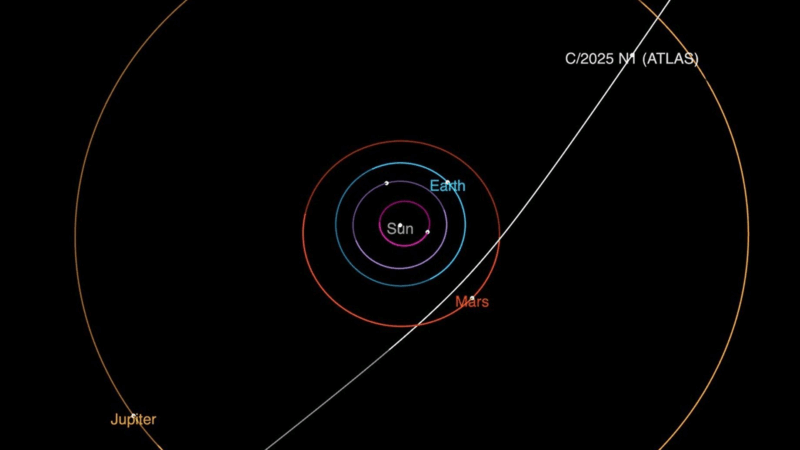NASA spots a new comet flying in from a distant star system
Astronomers have spotted a new comet, moving on a trajectory that indicates that it whizzed into our solar system from interstellar space and is just passing through.
It’s only the third time scientists have discovered this kind of visitor from outside our solar system. The first two, ‘Oumuamua and Comet Borisov, intrigued astronomers because of the chance to observe pieces from another star system beyond our own.
“This is like our chance to randomly sample what’s going on in the rest of the galaxy,” University of Oxford astrophysicist Chris Lintott recently told NPR, saying he and most other researchers really hadn’t given much thought to interstellar objects until the discovery of the first one in 2017.
“I think the idea that we could see bits of other solar systems flying through our own really captivated the attention of a whole lot of people who started trying to work on these things,” says Lintott.
NASA has named this latest interstellar object 3I/ATLAS, after detecting it this week with the NASA-funded ATLAS (Asteroid Terrestrial-impact Last Alert System) survey telescope in Rio Hurtado, Chile.
The comet is now about 420 million miles (670 million kilometers) away. Astronomers around the world are racing to use telescopes to learn more about its size and physical properties.
It’s moving fast, but poses no threat to Earth, according to NASA. The object will remain visible to ground-based telescopes through September, then will pass too close to the sun for observations to occur. But in December, it will re-emerge, allowing for more studies.
And astronomers are anticipating an imminent bonanza of new discoveries of interstellar objects, thanks to the Vera C. Rubin Observatory, a brand new facility with unique capabilities that should allow it to spot lots of interstellar objects in the years to come.
Built with funding from the National Science Foundation and the Department of Energy, the facility will collect a mind-boggling amount of data on the entire southern night sky during a decade-long survey slated to start later this year.
Supreme Court appears split in tax foreclosure case
At issue is whether a county can seize homeowners' residence for unpaid property taxes and sell the house at auction for less than the homeowners would get if they put their home on the market themselves.
Top House Dem wants Justice Department to explain missing Trump-related Epstein files
After NPR reporting revealed dozens of pages of Epstein files related to President Trump appear to be missing from the public record, a top House Democrat wants to know why.
ICE won’t be at polling places this year, a Trump DHS official promises
In a call with top state voting officials, a Department of Homeland Security official stated unequivocally that immigration agents would not be patrolling polling places during this year's midterms.
Surgeon general nominee Means questioned about vaccines, birth control and financial conflicts
During a confirmation hearing, senators asked Dr. Casey Means about her current positions and her past statements on a range of public health issues.
Rock & Roll Hall of Fame 2026 shortlist includes Lauryn Hill, Shakira and Wu-Tang Clan
The shortlist also includes a 1990s pop diva, heavy metal pioneers and a legendary R&B singer and producer.
This novel about family drama is so good you may want to re-read it immediately
Allegra Goodman's new novel is called This Is Not About Us, but critic Maureen Corrigan says that title is coy: Readers are bound to see aspects of themselves and their families in these pages.








